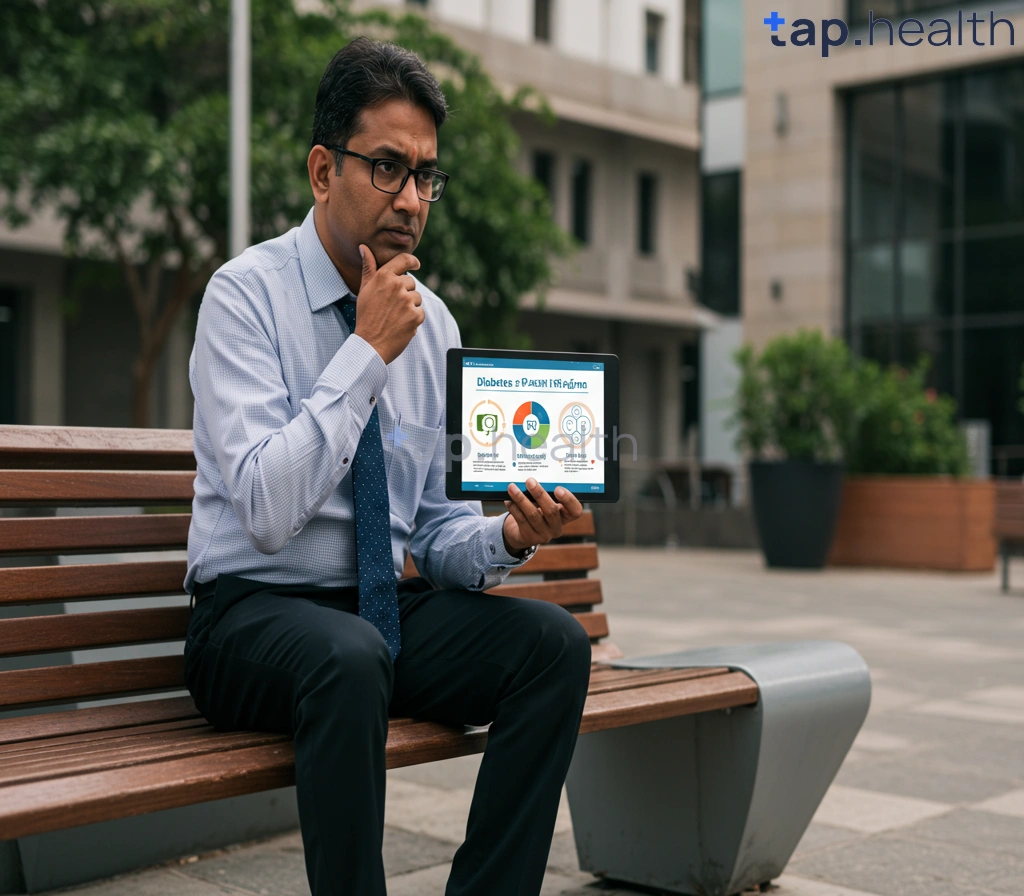Table of Contents
- Understanding Diabetes Management: Key Insights from Behavioral Medicine
- Behavioral Medicine’s Urgent Role in Diabetes Care
- Adapting to Life with Diabetes: A Guide from the Society of Behavioral Medicine
- Diabetes Self-Management: Proven Strategies from Behavioral Science
- Is Behavioral Medicine the Key to Effective Diabetes Management?
- Frequently Asked Questions
- References
Living with diabetes can feel like navigating a constantly shifting landscape, but you’re not alone. Adapting to Diabetes: Urgent Insights from the Society of Behavioral Medicine offers crucial strategies to help you manage this chronic condition effectively. This blog post dives into the latest research and practical advice, highlighting the vital role of behavioral medicine in achieving better diabetes self-management. We’ll explore how understanding your mindset and behaviors can significantly impact your blood sugar control and overall well-being. Get ready to discover empowering tools and techniques to transform your diabetes journey.
Understanding Diabetes Management: Key Insights from Behavioral Medicine
Diabetes management in India and tropical countries presents unique challenges. A significant portion of the population living with diabetes falls within the working-age group (20-64 years, representing 61% according to the International Diabetes Federation Atlas), alongside a substantial older population (65+, 39%). This necessitates a focus on behavioral interventions alongside medical treatment. Effective diabetes management isn’t just about medication; it’s about lifestyle changes.
Addressing Behavioral Factors in Diabetes Management
Behavioral medicine offers crucial insights into improving adherence to diabetes treatment plans. Many individuals struggle with dietary changes, regular exercise, and consistent blood glucose monitoring. In India and tropical countries, cultural factors, food habits, and limited access to resources can further complicate these challenges. Therefore, culturally sensitive educational programs are vital. For example, incorporating local recipes and adapting exercise routines to suit the climate can significantly improve patient engagement. Understanding the role of emotional eating can also be crucial; for more on this, see our blog on Addressing Emotional Eating in Diabetes: Strategies.
Practical Steps for Improved Diabetes Management
Practical strategies include: setting realistic, achievable goals; building a strong support network within the family and community; and seeking professional guidance from diabetes educators familiar with local contexts. Regular check-ups are essential for monitoring progress and adjusting treatment plans. Furthermore, mental health support is critical as stress can significantly impact blood glucose control. For more practical tips, check out our blog on 10 Proven Tips for Effective Diabetes Management.
Finding Support in Your Community
Taking control of your diabetes requires a holistic approach. Connect with local diabetes support groups, engage with healthcare professionals who understand the specific challenges in your region, and adopt lifestyle modifications tailored to your cultural context. This proactive approach will empower you to effectively manage your diabetes and lead a healthy life.
Behavioral Medicine’s Urgent Role in Diabetes Care
The Critical Link Between Diabetes and Sleep
Diabetes significantly impacts overall health, and recent research highlights a concerning connection: individuals with diabetes face a 70% increased risk of developing sleep apnea and other sleep disorders. This underscores the urgent need for a multi-faceted approach to diabetes management, one that integrates behavioral medicine strategies prevalent in Indian and tropical countries. Ignoring this link can lead to serious complications, worsening diabetes control and overall health outcomes.
Addressing Behavioral Factors in Diabetes Management in Tropical Climates
Effective diabetes management in India and other tropical regions requires addressing unique behavioral challenges. Heat and humidity can impact activity levels, making exercise adherence difficult. Cultural food habits, often rich in carbohydrates and fats, present dietary obstacles. Behavioral medicine interventions can help patients navigate these difficulties by providing personalized strategies for managing stress, improving sleep hygiene, and promoting healthy lifestyle changes adapted to the local context. This might include culturally sensitive dietary counseling or group support programs that account for the realities of life in these regions.
Empowering Patients Through Behavioral Change
Improving sleep quality is crucial. Strategies like practicing relaxation techniques before bed, maintaining a regular sleep schedule, and creating a conducive sleep environment can significantly improve sleep apnea symptoms and overall diabetes management. Further, incorporating mindfulness and stress-reduction techniques can empower patients to make sustained lifestyle changes. These could involve yoga, meditation, or other culturally relevant practices readily available in the region. For more information on the vital connection between sleep and diabetes management, please see our article on The Importance of Quality Sleep in Managing Diabetes.
Taking Action: A Call to Improve Diabetes Care
The integration of behavioral medicine into diabetes care is not just beneficial; it’s essential, particularly in regions like India and other tropical countries where unique lifestyle and environmental factors play a significant role. It’s also important to consider the impact that diabetes can have on mental health. Learn more in our article, The Impact of Diabetes on Mental Health. Let’s work together to create accessible and culturally sensitive programs to improve the lives of those living with diabetes and related sleep disorders.
Adapting to Life with Diabetes: A Guide from the Society of Behavioral Medicine
The global burden of diabetes is staggering. The World Health Organization reports a dramatic increase, from 200 million people living with diabetes in 1990 to a shocking 830 million in 2022. This surge is particularly significant in Indian and tropical countries, where lifestyle factors and access to healthcare often present unique challenges. Understanding how to effectively manage diabetes in these regions is crucial.
Managing Diabetes in Hot Climates
High temperatures and humidity prevalent in many Indian and tropical countries can exacerbate diabetes symptoms. Staying hydrated is paramount; increased fluid intake helps regulate blood sugar levels and prevents dehydration. Regular blood glucose monitoring becomes even more critical in these conditions. Consider scheduling check-ups more frequently during peak heat. Dietary adjustments are also important; consuming lighter meals, focusing on fruits and vegetables, and limiting sugary drinks can help manage blood sugar fluctuations.
Cultural Considerations and Support Systems
In many Indian and tropical cultures, food plays a central role in social gatherings and celebrations. Learning to navigate these social situations while managing diabetes requires planning and mindful choices. Seeking support from family, friends, and community groups can be incredibly beneficial. Many organizations offer diabetes support groups tailored to specific cultural contexts and needs, providing a vital network for sharing experiences and coping strategies. For additional tips on effective management, check out our guide: 10 Proven Tips to Effectively Manage Diabetes | Simple Guide.
Seeking Professional Guidance
Access to quality healthcare is essential for effective diabetes management. Regular consultations with doctors and diabetes educators are vital for personalized treatment plans, including medication management and lifestyle modifications. It’s crucial to proactively address any concerns and actively participate in your care. The challenges of managing diabetes can evolve over time, and understanding these changes is important. For insights into managing diabetes as you age, please see our article: Managing Diabetes as You Age: Challenges and Solutions.
Remember: Adapting to life with diabetes requires a holistic approach. By understanding the specific challenges in Indian and tropical countries and actively engaging in self-management, you can take control of your health and well-being. Connect with local diabetes support groups and healthcare professionals to create a personalized plan that works for you.
Diabetes Self-Management: Proven Strategies from Behavioral Science
Up to 80% of Type 2 diabetes cases can be prevented through lifestyle changes, a compelling statistic highlighting the power of behavioral science in diabetes management. This is particularly crucial in Indian and tropical countries, where diabetes prevalence is rising. Successfully managing diabetes requires more than just medication; it demands a holistic approach that addresses the behavioral aspects of the disease.
Understanding the Behavioral Side of Diabetes
Many individuals struggle with consistent adherence to prescribed diets and exercise routines. Behavioral science offers effective strategies to overcome these challenges. These strategies focus on building sustainable habits, improving self-efficacy, and addressing psychological barriers to change. For example, incorporating culturally relevant foods and physical activities can significantly improve adherence in Indian and tropical contexts.
Practical Strategies for Effective Self-Management
Setting realistic, achievable goals is key. Instead of drastic overnight changes, focus on small, incremental improvements. Tracking progress, whether through journaling or using mobile apps, provides valuable feedback and reinforces positive behavior. Seeking support from family, friends, or support groups is vital; the social aspect of managing diabetes shouldn’t be underestimated, especially within the strong community ties prevalent in many Indian and tropical communities. Consider incorporating traditional practices that promote wellness alongside modern medical advice. For more on creating a personalized plan, check out Personalized Diabetes Control: Your Key to Better Health.
Taking Action Today
The potential to delay or prevent Type 2 diabetes through lifestyle modifications is significant. Start by making small, sustainable changes today. For some simple starting points, see 5 Easy Lifestyle Changes to Manage Type 2 Diabetes. Consult with a healthcare professional or a certified diabetes educator to develop a personalized self-management plan that aligns with your cultural background and lifestyle. Remember, your health journey is a marathon, not a sprint, and consistent effort is rewarded with improved well-being.
Is Behavioral Medicine the Key to Effective Diabetes Management?
The staggering statistic that 50% of diabetes cases worldwide remain undiagnosed, as highlighted by the International Diabetes Federation, underscores a critical need for proactive and effective management strategies, particularly in Indian and tropical countries. This often overlooked aspect points to the crucial role of behavioral medicine in tackling this global health crisis. Effective diabetes management isn’t solely about medication; it’s profoundly intertwined with lifestyle choices and behavioral patterns. Managing diabetes effectively also often requires attention to other health factors. For example, learning how to manage cholesterol levels with diabetes is crucial for overall well-being.
Understanding the Behavioral Aspect of Diabetes in Tropical Climates
Many individuals in tropical regions face unique challenges in managing diabetes. Factors like readily available, high-carbohydrate diets, limited access to consistent healthcare, and cultural norms can significantly impact adherence to treatment plans. Behavioral medicine addresses these challenges head-on by focusing on individual-level interventions, such as dietary modification education, stress management techniques, and promoting regular physical activity tailored to the local context. For example, incorporating traditional, diabetes-friendly recipes into educational programs can significantly improve engagement and adherence. Maintaining a strong immune system is also vital, and you can learn more about boosting immunity while managing diabetes in our related article.
Actionable Steps for Better Diabetes Management
Effective diabetes management requires a holistic approach. This means working closely with healthcare professionals to create personalized plans that account for individual circumstances and cultural nuances. Prioritizing regular check-ups, incorporating culturally appropriate exercise regimes (like yoga or dance), and seeking support groups are all vital aspects of this integrated approach. Furthermore, addressing underlying psychological factors like stress and anxiety, often exacerbated by the challenges of managing a chronic condition, can lead to improved self-management behaviors.
Taking Charge of Your Health
The impact of behavioral medicine on diabetes management in Indian and tropical countries cannot be overstated. By understanding the cultural context and addressing the behavioral determinants of the disease, we can significantly improve outcomes and empower individuals to take control of their health. Seek support from your healthcare provider to develop a personalized diabetes management plan that incorporates behavioral strategies relevant to your specific needs and lifestyle.
Frequently Asked Questions on Diabetes Management Insights | Behavioral Medicine Strategies
Q1. What are the biggest challenges in managing diabetes in tropical countries like India?
High prevalence among working adults and the aging population, coupled with the need to integrate behavioral medicine with medical treatment and address lifestyle factors like diet and exercise within cultural contexts.
Q2. How can I effectively manage my diabetes while considering cultural factors and food norms?
A holistic approach is crucial. This includes setting achievable goals, building a strong support network, seeking professional guidance, and incorporating culturally sensitive practices and mindful food choices into your plan.
Q3. What role does lifestyle play in managing and preventing type 2 diabetes?
Lifestyle changes are extremely important. Prioritize regular exercise, a balanced diet, stress reduction techniques, and sufficient sleep. These factors significantly impact both management and prevention of type 2 diabetes.
Q4. What kind of support is available to help me manage my diabetes long-term?
Access to quality healthcare, culturally tailored support groups, and professional guidance are essential. Building a support network of family and friends is also beneficial.
Q5. How can I adapt my diet and lifestyle to the hot and humid climate of tropical regions?
Stay well-hydrated and make dietary adjustments as needed. Plan meals that account for the heat and humidity, and consider the impact of temperature and humidity on your energy levels and exercise routine.
References
- A Practical Guide to Integrated Type 2 Diabetes Care: https://www.hse.ie/eng/services/list/2/primarycare/east-coast-diabetes-service/management-of-type-2-diabetes/diabetes-and-pregnancy/icgp-guide-to-integrated-type-2.pdf
- A Comprehensive Review of Modern Methods to Improve Diabetes Self-Care Management Systems: https://thesai.org/Downloads/Volume14No9/Paper_20-A_Comprehensive_Review_of_Modern_Methods_to_Improve_Diabetes.pdf




